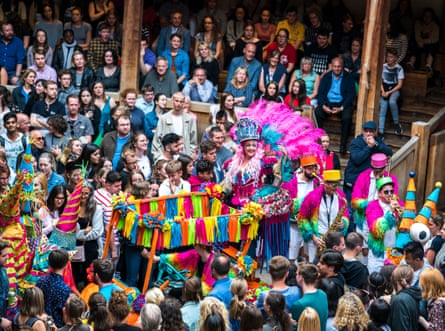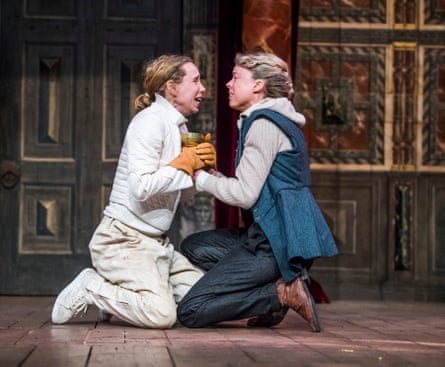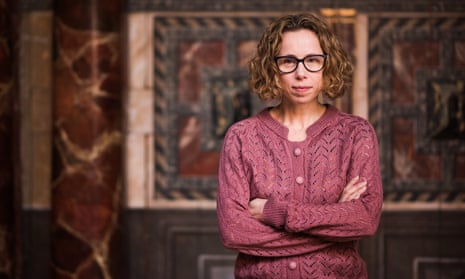When Shakespeare’s Globe announced its reopening plans for spring, the headline news was that it had killed off the interval. Shows in its new season will run without a break as part of Covid safety protocols that include, for the first time, seats spread out in the theatre’s yard where groundlings have traditionally jostled shoulder to shoulder.
The Globe’s artistic director, Michelle Terry, pointed out that the plays were not written with intervals in the first place. When we catch up for a chat a week or so before the theatre reopens, she adds that audiences will be given a “beautiful autonomy”, liberated from the strictures “must sit in seat, must face forward, lights must go down”. To pee or not to pee is a question no longer reserved for the halfway point. “You can come in and out, that’s your right,” she says. “Go to the loo, go to the gift shop, go to the bar which will stay open.” It’s about trusting Shakespeare as a writer, rather than worrying about what you may miss. “If it’s really that important, he’ll probably repeat it at least five times,” she says with a laugh.
The actor-director, who will play Viola in this summer’s Twelfth Night, can’t wait for the Wooden O on the South Bank to once more hold theatregoers in its distinctive embrace. “There are … lots of feelings,” she says. Chiefly: pride, excitement and a sense of profundity. After such an extended period of division and isolation, the season is billed as celebrating all that unites us. Sean Holmes’s hard-partying 2019 staging of A Midsummer Night’s Dream is back to kick things off, followed by rising director Ola Ince’s Romeo and Juliet, which was already in rehearsals when theatres were forced to close in March last year.

Looking back on those first fraught weeks of closure, Terry recalls being stunned by the severity of the crisis but also sensing a “galvanising force” brought about by crisis management which felt invigorating. Questions came thick and fast, she says: “How do we survive, how do we support our neighbours, how do we pivot to digital?” As the months went by and the country moved in and out of lockdowns, England’s venues allowed to open and then forced to close their doors with little advance warning, the unsettling sense of uncertainty set in. Theatres’ curtailed Christmas season was a particularly bitter blow. It was very hard to have hope, she admits.
But as Sadiq Khan said on Monday, when he signed in to begin his second term as mayor of London in a ceremony at the Globe, this playhouse’s story is “a tale of resilience and renewal”. Between 1603 and 1613, the Globe and other theatres in the capital were shut for a total of 78 months to prevent the spread of the plague.
Terry has not put on a live show since last March. While many other outdoor venues reopened in summer 2020, the Globe maintained that as an independent charity with very limited reserves it was not economically viable to open for a reduced audience. Awarded a grant of just under £3m from the government’s culture recovery fund, the Globe was hailed by culture secretary Oliver Dowden as one of the “irreplaceable parts of our heritage” that help make Britain a “cultural superpower”.

Terry says she is “disturbed” by the proposed 50% funding cut to arts subjects at universities, which could come into effect from this autumn. The theatre sector, she says, has put the case effectively for its contribution to the economy. The harder task is finding a way to articulate the social impact of the arts. Financial arguments can be made with metrics but “I don’t think maths is going to be able to answer the question ‘to be or not to be?’!” The scale of our climate crisis is overwhelming, she continues, but the notion of a carbon footprint is readily understandable. The myriad contributions of the arts to the health of the nation, rather than the wealth, needs to be made similarly tangible.
A big thinker, Terry shares a sense of warmth and wonder with her predecessor at the Globe, Emma Rice, who stepped down in 2018 and said her freedom to experiment had been blocked at the theatre and that the board did not respect her. Terry has been radical in her own ways, dismantling traditional hierarchies by promoting a democratic ensemble approach. Her first season opened with Hamlet and As You Like It, with roles assigned by the actors themselves during the rehearsal period. (Terry played the tragic prince, and has since been Lady Macbeth opposite her husband, Paul Ready.) Audiences have also been given more power, including the decision to choose from a selection of plays offered by the touring ensemble.
The working practices of Shakespeare’s first players are still at the heart of Terry’s Globe. “A lot of the time,” she says, “we’re going: what did they do 400 years ago?” A new play inspired by Ovid’s Metamorphoses, which is planned to reopen the indoor Sam Wanamaker Playhouse in September, is being created by three writers in residence (Sami Ibrahim, Laura Lomas and Sabrina Mahfouz). It mirrors Shakespeare’s original “writers’ room”, Terry says, who “would have been working and writing bespoke to the architecture, the artists, the seasons”. Ovid, who was a rich source material for Shakespeare, asks questions about the “infinite capacity of human transformation” and “where we sit in the cosmos”, she says – pertinent issues for a global crisis. Ovid, she adds, also knew about experiencing exile.

Metamorphoses will be livestreamed from the Globe, as will Romeo and Juliet, Twelfth Night and A Midsummer Night’s Dream, which has an accompanying “anti-racist Shakespeare” webinar. “We talk a lot about Shakespeare’s multiplicity and universality,” she says, “but whose prism are we looking at that through? Is it as cosmopolitan, multicultural and intercultural as we hope that it is? I think the truth is that it isn’t.”
It is essential to ask “who feels welcome in this space?” says Terry. Like Matthew Warchus at the Old Vic, she wants her theatre to be as welcoming and unintimidating as possible for audiences old and new. The touring ensemble will start what she calls a grassroots conversation with local communities. “A huge number of Londoners know about the Globe, like the idea of the Globe, but haven’t visited,” Terry recognises. That’s a big piece of work – to get the people who are local to us to want to come and engage.”
If the theatre was opening at full capacity, Terry would be more nervous. “I would ask how are we going to fill 13 shows a week with 1,600 people?” As society gradually reopens and London gets busier, so the Globe’s number of shows and the capacity will increase. For now, though, “fingers crossed, touch all the wood that the building is made of, we’ll be inviting 400 people back into the space,” she says and pauses. “That’s so profound. What it is for human beings to be together again.”
